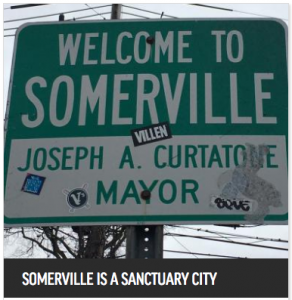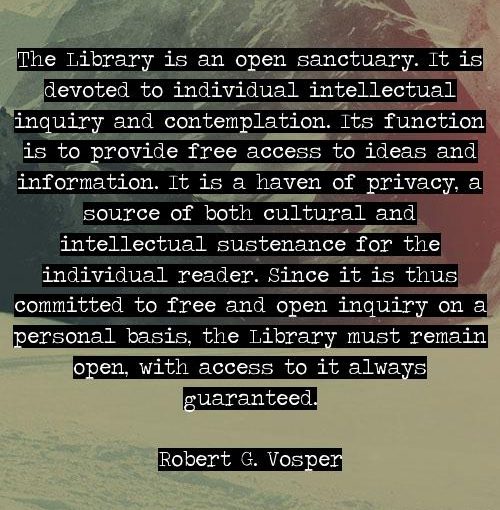
Mayor Marty Walsh of Boston (home to Simmons College School of Library and Information Science), and Joe Curtatone of Somerville (my home town) have both reaffirmed their commitment to remain sanctuary cities despite two executive orders signed by President Donald Trump threatening to cut off federal funding to those cities.
In an open letter, Mayor Curtatone asserted “Our city-Somerville, Massachusetts-will not waver… Somerville will stand with you regardless of your race, creed, color, sex, nationality, legal status, religion, gender identity, or sexual orientation.” In this letter, Curtatone also acknowledged that Somerville stands to lose a lot in terms of loss of federal funds. Somerville receives about $6 million per year in federal funds, or about 3% of its annual budget. He pointed out that those funds go to support important services including the schools’ free and reduced lunch program, substance abuse programs, and homeland security services.
Although not specifically mentioned in Curtatone’s post, libraries have a huge role to play in sanctuary cities. In fact, public libraries could be considered the ultimate sanctuary space: public libraries are free to all people, at all times. Anyone, of any race, color, creed, or immigration status, can enter a public library and use their resources, spaces, and services for free. They can receive one-on-one research and assistance from a librarian, and participate in programs and training sessions. No one is asked to identify themselves to enter the library and use their resources on site, and most public libraries (not all, I know, but many) have policies that aim to enable, rather than inhibit, access to a library card.
Public libraries have a particularly long history of welcoming and serving our immigrant population. From their inception, many of these libraries have offered an array of services and resources including English Language Learning classes and support for applying for citizenship and preparing for the citizenship exam.  My father moved to Somerville from Carpineto, Italy, in the mid 1950’s, and he often talked about the Somerville Public Library (specifically the East Branch) as the place he could go to get books he couldn’t afford to buy himself, and to work on his language skills. More recently, public libraries have worked to move beyond services focused on enculturating new immigrants to services that respect and support their native heritage as well. This includes cultivating collections in languages other than English, running conversation circles in which participants are able to practice a variety of languages in addition to English, and hosting bilingual story times for children. For some people, access to technology such as email, Skype, and so on allows them to keep in touch with loved ones outside of the United States.
My father moved to Somerville from Carpineto, Italy, in the mid 1950’s, and he often talked about the Somerville Public Library (specifically the East Branch) as the place he could go to get books he couldn’t afford to buy himself, and to work on his language skills. More recently, public libraries have worked to move beyond services focused on enculturating new immigrants to services that respect and support their native heritage as well. This includes cultivating collections in languages other than English, running conversation circles in which participants are able to practice a variety of languages in addition to English, and hosting bilingual story times for children. For some people, access to technology such as email, Skype, and so on allows them to keep in touch with loved ones outside of the United States.
Needless to say, libraries also stand to be impacted by loss of federal funds, which support state aid and grant funding, as well as programs like e-rate which provides libraries and schools with reduced price Internet access. Nevertheless, I am proud to see many libraries, like the cities in which they reside, affirming their commitment to be sanctuary spaces. In a recent post, the Somerville Public Library referred to Mayor Curtatone’s open letter, adding “we wish to affirm that the Somerville Public Library is a place for all residents of the city, where everyone is welcome. American public libraries have always been a haven for everyone, providing people the means to have better, richer lives.” The post also points readers to a list of resources to support and assist “Somerville’s newer residents.”
The next four years are going to be a major challenge for institutions like libraries, and for cities like Boston and Somerville. But now, more than ever, is a time for us to assert our values as democratic institutions. We have a proud history of libraries as sanctuaries, including the Ferguson Library in Ferguson Missouri, which stayed open and provided a haven for children and adults and even when schools and other community centers closed amidst rioting; the Enoch Pratt Free Library in Baltimore which also stayed open despite unrest in the city (at the time the library was led by our current Librarian of Congress, Dr. Carla Hayden); and libraries that provided emergency and relief response after hurricanes and other natural disasters. In that same spirit, a recent LA Times article pointed to libraries as a way to weather the Trump administration, suggesting that these libraries “may just save us.” I hope that libraries across the country, whether in sanctuary cities or not, can let those examples guide us, adhere to our values and principles, and stand strong in the face of racism and discrimination as we weather the next four years.

Hooray for libraries and librarians! Bastions of freedom and equality. Long may they prosper and growing, nurturing their communities.